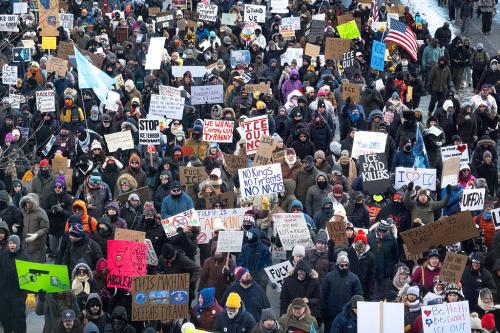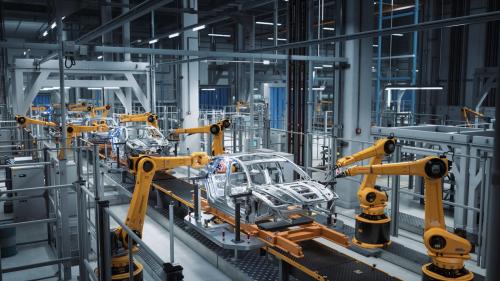The occasion for taking the pulse of the political, economic, and social situation of the region could not have come at a better time. The first session of the New Generation Democracy Forum for the Americas took place Monday, August 24, in Bogotá, while the Chinese stock market was taking a dive and dragging all the other stock markets with it, the Bloomberg raw materials index had sunk to its lowest level in the last 16 years, the political crisis was becoming more critical in Guatemala as President Pérez Molina refused to step down, and, as if that weren’t enough, the Maduro regime ordered that the border with Colombia be closed, sparking a humanitarian crisis and resulting in much tenser relations with the administration of President Juan Manuel Santos.
The Forum, convened by the Club of Madrid, International IDEA, FLACSO, and the Fundación Buen Gobierno, met at the Universidad de los Andes from August 24 to 26. It included the participation of seven former presidents and prime ministers, among them former President Laura Chinchilla, as well as President Santos, OAS Secretary General Luis Almagro, and International IDEA Secretary General and former Prime Minister of Belgium, Yves Leterme.
The debate, which was very rich, revolved around such a wide variety of issues that it would be impossible to address them all in this article. For now, I will outline six:
1. There was consensus that Latin America (especially South America) is experiencing a new economic cycle characterized by weak economic growth as a result of a combination of three factors: the Chinese slowdown, the fall in raw materials prices, and the imminent increase in interest rates in the United States. For this year the IMF is projecting anemic average growth of 0.4% for the region.
2. The participants also agreed that the vast majority of countries should carry out, urgently and without delay, the reforms that they did not implement during the years of prosperity. These should be aimed at diversifying the productive and export matrix, increasing competitiveness (Latin America’s real Achilles heel), and investing heavily in education, innovation, and infrastructure, all with the objective of modernizing the development model and helping the region become strategically inserted in the new global context.
3. One of the main issues cutting through most of the discussions was how the economic slowdown may endanger the major social gains the region made during the last decade, and the possible consequences of deteriorating social conditions for democratic governance in the face of an ever more conscious citizenry taking more initiative to demand its rights. If effective solutions to these issues are not found, it is likely that in some countries we will see greater social conflict and more complex governability.
4. The priority is to safeguard the major social gains attained during the last decade, when 70 million people emerged from poverty. Due to these gains, the social reality of Latin America changed dramatically, and for the better; yet since 2012, according to ECLAC, the reduction of poverty and inequality has stagnated. To that end, the rules must provide citizens a satisfactory explanation of the new cycle the region is experiencing and its expected consequences, as well as the need to achieve multi-party and multisectoral agreements (government, political parties, private sector, trade unions, civil society) aimed at managing the crisis and its effects, making transparent the distribution of costs as per the capacity of each sector. Maintaining and furthering social gains in an environment of lower growth demands more effective public policies, which at the same time presupposes a modern and strategic, open, and transparent state that is accountable, with a professional and modern public administration and sufficient fiscal strength.
5. The need to improve the quality of democracy and the integrity of the elections was a major focus of our discussions. Opinion polls clearly show that citizens support democracy but are dissatisfied with how it is performing, and profoundly distrustful of the institutions and politics. In many countries political parties are perceived to be in decline and highly corrupt.
Hence the urgent need, warned former President Ricardo Lagos, to recover the legitimacy and credibility of the institutions, especially of the political parties, so as to reconnect them with the citizenry. To that end it is essential to modernize them, ensure their internal democracy, make their finances transparent, and provide them with programmatic content. As Yves Leterme put so well, “we have 19st century institutions to tackle problems of 21st-century societies.”
A quality democracy, according for former President Laura Chinchilla, should be inclusive and tolerant, capable of ensuring freedom and human rights, effective (produce results), and respectful of the separation of powers and alternation in government. Therefore it is not enough, as former President Alejandro Toledo keenly noted (citing the Inter-American Democratic Charter), referring to the danger of the new authoritarianisms, to have legitimacy of origin; there must also be legitimacy of exercise.
Strengthening the judicial branches and the oversight agencies to ensure juridical security and a head-on fight against corruption was another priority identified by the participants.
6. Obviously, no analysis of the Latin American situation would be complete without considering the Colombian peace process or the legislative elections to be held in Venezuela on December 6. On the first point, President Santos expressed his optimism that the armed conflict will be brought to an end soon. He also noted that the parties are seeking to strike a balance between justice and peace: “as much justice as the peace process allows.”
The second issue, Venezuela’s upcoming legislative elections, was the subject of much discussion. Several participants stated their concern that the Venezuelan elections might not be held, or if held might not have sufficient internal guarantees or international electoral supervision to guarantee that the contest is free and fair. At the Forum the OAS Secretary General clearly and expressly stated the interest of the OAS in sending an electoral observation mission, which he will continue to advocate for despite the current refusal of that offer by the Venezuelan regime, since the OAS has a very good record and considerable prestige in the area of electoral observation, and therefore is in a position to make a technical contribution that is useful to the parties.
My opinion: The external tailwind stopped blowing and Latin America must adapt quickly and strategically to a much more complex, volatile, and unpredictable context.
The region (beyond its heterogeneity) is leaving behind a “golden decade” and entering a new stage that is accompanied by major challenges that demand political leadership that is up to the new realities.
Latin America needs to recover high and ecologically sustainable growth rates; safeguard the social gains made to date; modernize and strengthen its institutions, and improve the quality of its democracies. It should also strengthen its process of integration to collectively solve its problems and challenges. In a global scenario of “continent countries” (“países continentes”), as Lagos put it, either we integrate and learn to speak up with a single voice in defense of our interests, or we run the risk of becoming irrelevant.
The Brookings Institution is committed to quality, independence, and impact.
We are supported by a diverse array of funders. In line with our values and policies, each Brookings publication represents the sole views of its author(s).



Commentary
Op-edTowards a new-generation democracy
September 4, 2015